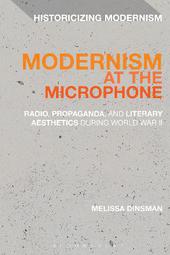
|
Modernism at the Microphone: Radio, Propaganda, and Literary Aesthetics During World War II
Paperback / softback
Main Details
| Title |
Modernism at the Microphone: Radio, Propaganda, and Literary Aesthetics During World War II
|
| Authors and Contributors |
By (author) Dr Melissa Dinsman
|
| Series | Historicizing Modernism |
|---|
| Physical Properties |
| Format:Paperback / softback | | Pages:264 | | Dimensions(mm): Height 234,Width 156 |
|
| Category/Genre | Radio
Literary studies - from c 1900 -
Second world war |
|---|
| ISBN/Barcode |
9781350028456
|
| Classifications | Dewey:809.9112 |
|---|
| Audience | | Tertiary Education (US: College) | |
|---|
|
Publishing Details |
| Publisher |
Bloomsbury Publishing PLC
|
| Imprint |
Bloomsbury Academic
|
| Publication Date |
23 March 2017 |
| Publication Country |
United Kingdom
|
Description
As the Second World War raged throughout Europe, modernist writers often became crucial voices in the propaganda efforts of both sides. Modernism at the Microphone: Radio, Propaganda, and Literary Aesthetics During World War II is a comprehensive study of the role modernist writers' radio works played in the propaganda war and the relationship between modernist literary aesthetics and propaganda. Drawing on new archival research, the book covers the broadcast work of such key figures as George Orwell, Orson Welles, Dorothy L. Sayers, Louis MacNeice, Mulk Raj Anand, T.S. Eliot, and P.G. Wodehouse. In addition to the work of Anglo-American modernists, Melissa Dinsman also explores the radio work of exiled German writers, such as Thomas Mann, as well as Ezra Pound's notorious pro-fascist broadcasts. In this way, the book reveals modernism's engagement with new technologies that opened up transnational boundaries under the pressures of war.
Author Biography
Melissa Dinsman is a CLIR Postdoctoral Fellow in Data Curation for Visual Studies, University of Notre Dame, USA.
ReviewsDinsman's volume is refreshing in its treatment of radio as a medium for which national borders are permeable, if persistent, barriers to cultural exchange. By connecting the wartime output of writers from Germany (Thomas Mann, Theodor Adorno, Bertolt Brecht, and Walter Benjamin), the United States (Archibald MacLeish, Ezra Pound, and Orson Welles), Britain (Dorothy Sayers, Louis MacNeice, and George Orwell), and the British Empire (Mulk Raj Anand), Dinsman captures the global extent of wartime broadcasting and its ability to forge networks for both quasi-military aggression and cultural connection ... By addressing a broad swath of the figures who made important contributions to wartime radio, Dinsman makes a significant contribution to the fields of wartime literary and cultural study. * The Space Between * [An] account of the various ways in which many of Modernism's greatest names interacted with the radio ... The most compelling sections delineate the fruitful interactions of unlikely collaborators. * Times Literary Supplement * [This book] is thought-provoking and informative. It adds to a dynamic and engaging field with readings of a variety of authors both well known and less studied. * Review of English Studies * An informative overview of radio in relation to key modernist figures and to modernist aesthetics more generally. It conveys both contemporary reservations regarding radio as a form of mass communication and some of the ways in which it helped to inspire modernist innovation. * The Year's Work in English Studies *
|